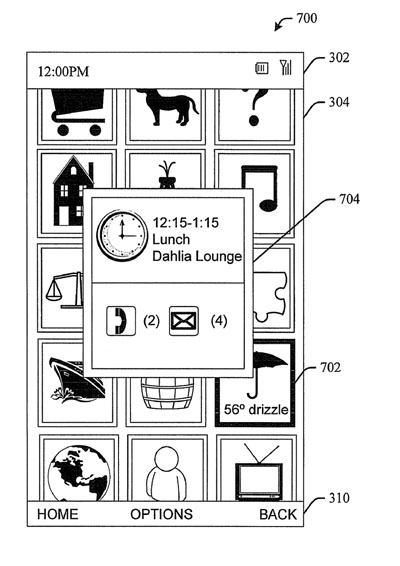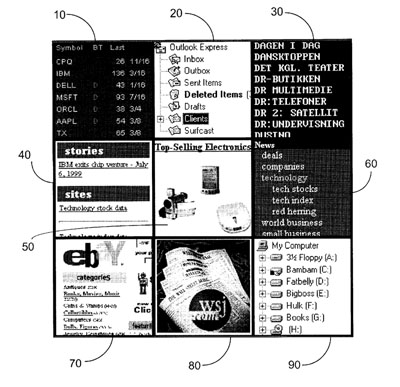PORTLAND – A little-known company based in a condominium in the West End is taking on one of the world’s software giants, claiming that Microsoft infringed on one of its patents with a new smartphone operating system and other products.
SurfCast claims it developed the idea behind “Live Tiles,” the key characteristic in the user interface of Microsoft’s Windows Phone 8 operating system, in the 1990s.
It argues in a complaint filed in U.S. District Court this week that Microsoft infringed on the patent that SurfCast first filed in 2000 and was issued in 2004.
It’s not clear whether SurfCast intended to create any products using the concept.
In response to the lawsuit, technology experts have speculated on the Internet whether SurfCast is a “patent troll,” a company that holds intellectual property but doesn’t make products and often sues companies over the technology they use.
Chris Caseiro, a patent attorney with Verrill Dana in Portland, said SurfCast could be involved in such activity but he wouldn’t call the company a patent troll.
Caseiro, who is not involved in the lawsuit, said that for a patent troll, also known as a non-practicing entity, the business model could be to sue a big company with deep pockets and reach a settlement for licensing. It could then use that to bolster its ability to obtain licenses from other companies.
SurfCast has not been a party in lawsuits filed in federal courts near Silicon Valley in California, Microsoft’s headquarters in Washington state or the Eastern District of Texas, where Caseiro said such cases are usually filed because the courts are perceived as patent-holder friendly and efficient.
Most patent infringement lawsuits are settled out of court, Caseiro said.
It’s not clear how SurfCast ended up in Maine. The company is incorporated in Delaware and operates from a condominium in Portland that apparently is the home of its founder and CEO, Ovid Santoro, whose experience includes positions at Deutsche Bank Venture Capital and Red Herring magazine, according to SurfCast’s website. The patent filing lists Santoro and Klaus Lagermann as the inventors.
SurfCast’s patents indicate that the company has been located in Palo Alto, Calif., and in Lincolnville, where Santoro also lives, according to the lawsuit. His residence has also been listed on patent papers as Northport, London and New York.
No one responded to the doorbell Friday afternoon at the suite listed for Santoro and SurfCast, in a converted brick school building on Carroll Street.
Reached by phone later Friday, Santoro said he could not comment on the lawsuit but hoped to talk in a week or so. He would not say why he could not comment.
He would not discuss any other details about himself or his company, other than to give his age as 52.
On its website, which gives minimal details about the company, SurfCast says it designs operating system technology and holds four patents, with more pending. Santoro is listed as one of the inventors for each of the four patents, all of them dealing with “system and method for simultaneous display of multiple information sources.”
The SurfCast website is basic, containing only a photo of a woman on a beach with a fishing rod and a beige background, with basic text details.
The site has five pages, including one that lists its founders and directors. Their work backgrounds include venture capital, finance and technology. Another page lists the four patents. Its “News” page contains only a press release about its lawsuit.
The complaint, filed days after Microsoft’s launch of the new smartphone technology, claims that Microsoft knew of SurfCast’s patent since at least April 2009 and instructed its developers to write applications that infringe on SurfCast’s patent.
SurfCast describes its concept as “dynamically updating icons.” In its lawsuit, it cites a Microsoft description of its user interface that says, “Through tiles on the Start screen, apps are alive with activity and can deliver vibrant content, even when they’re not running.”
Microsoft issued a statement saying, “We are confident we will prove to the court that these claims are without merit and that Microsoft has created a unique user experience.”
SurfCast’s lawyers, Timothy Bryant and Benjamin Piper of Preti Flaherty in Portland, did not return calls seeking comment Friday.
Caseiro said it appears that the complaint was properly filed but any ensuing litigation would likely be complex.
The defense will likely argue that the patent in question is invalid because the patent examiner made an incorrect analysis or missed a detail, he said.
Staff Writer Ann S. Kim can be contacted at 791-6383 or at:
akim@pressherald.com
Twitter: AnnKimPPH
Send questions/comments to the editors.




